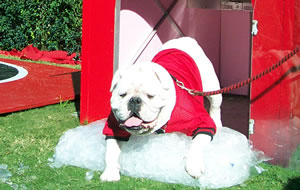 History lesson
History lesson
I wrote a few weeks ago that the New York Times has recently opened up its archives after years behind a paywall. One of the more popular applications to come of this opening of a rich historical trove is to look for the first mention of everyone and everything from Hitler to Britney Spears.
So naturally, I wondered about a few items close to our own heart.
First mention of the University of Georgia: April 2, 1852
In an article featuring a couple of spiritual mediums in hot water, it is mentioned that
The University of Georgia has 175 students, of whom 151 are in actual attendance. There are two literary societies connected with the University – the Phi Kappa and the Demosthenian.
There’s at least one member of the Dawgosphere who will be very happy to see his society mentioned in this historic news clipping.
You can see some of the other early articles related to the University.
First mention of the “University of Georgia” and “football”: August 18, 1897
The first mention of UGA football has very little to do with Georgia’s program. Cornell has found a coach, and he’s Glenn “Pop” Warner. The article notes,
In previous years the team has been coached by old Yale and Harvard players. Warner has already turned out winning teams for the University of Georgia and the University of Iowa. He will endeavor at Cornell to develop a distinct style of play.
Warner was 7-4 in two seasons at Georgia, and he gave the University its first undefeated season with a 4-0 mark in 1896.
The second article mentioning Georgia football deals with the 1897 fatal injury to Richard Vonalbade (“Von”) Gammon in a game against Virginia. Gammon died of the head injury the next day, and the state of Georgia was set to ban the game of football at state schools. A letter from Gammon’s mother convinced the governor not to sign the ban. Her letter read, in part,
It would be the greatest favor to the family of Von Gammon if your influence could prevent his death being used for an argument detrimental to the athletic cause and its advancement at the university. His love for his college and his interest in all manly sports, without which he deemed the highest type of manhood impossible, is well known by his classmates and friends, and it would be inexpressibly said to have the cause he held so dear injured by his sacrifice. Grant me the right to request that my boy’s death should not be used to defeat the most cherished object of his life.
1892 Pandora – “History of Athletics”
The Anti-Orange Page has a feature from the 1892 Pandora yearbook looking back at some of the first football and baseball games. Lots of great tidbits in there:
- “The next thing is a new gymnasium. It was mentioned some time ago, but not much has been heard of it lately. Let those in authority take advantage of the opportunity and keep up the enthusiasm by their substantial aid.” Even in 1892, facilities for athletics were an issue.
- “But after all, they (Auburn) refused outright to play us baseball, fearing the team here, about which so much has been written and said.” The South’s oldest rivalry indeed. Even in 1892, an article’s not complete without calling Auburn a bunch of cowards.
- “It was not until the fall of 1890, that there was awakened among the students the proper spirit of enthusiasm. At this time Dr. Charles Herty came to the University as Instructor in Chemistry, and the whole success of our Association is due entirely to him.” Herty was, of course, Georgia’s first football coach.
My favorite line though is this remark about the uselessness of mascots after a 10-0 loss to Auburn:
About a month later we tackled Auburn, proving without doubt that there is no virtue in mascottes, for Robert and his goat availed us naught.
The University of Georgia has come around just a little bit on the subject of mascots.


 Dawg Media
Dawg Media